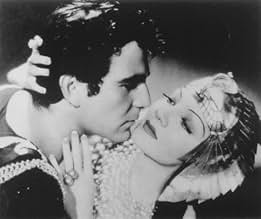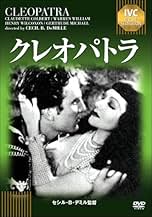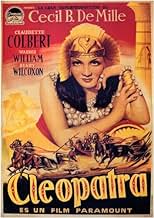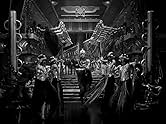La Reina de Egipto, hambrienta de hombres, lleva por el mal camino a Julio César y Marco Antonio, en medio de escenas de esplendor de DeMille.La Reina de Egipto, hambrienta de hombres, lleva por el mal camino a Julio César y Marco Antonio, en medio de escenas de esplendor de DeMille.La Reina de Egipto, hambrienta de hombres, lleva por el mal camino a Julio César y Marco Antonio, en medio de escenas de esplendor de DeMille.
- Dirección
- Guionistas
- Elenco
- Ganó 1 premio Óscar
- 2 premios ganados y 4 nominaciones en total
Ian Maclaren
- Cassius
- (as Ian MacLaren)
Ferdinand Gottschalk
- Glabrio
- (escenas eliminadas)
Jayne Regan
- Lady Vesta
- (as Jane Regan)
Opiniones destacadas
Spectacular DeMille hokum that, like most of his work, is hard to dislike despite its flaws. Say what you will about Cecil B. DeMille but he knew how to put on a show. The sets, costumes, and pageantry are excellent. The actors are all very enjoyable even if they ham it up some. Claudette Colbert is sexy and a treat to watch. Warren William's Julius Caesar seems like he would be more at home shooting craps or hustling pool than ruling Rome. Henry Wilcoxon is quite good as Marc Antony. The rest of the cast is solid, as DeMille supporting casts usually were. I have no sympathy for history buffs who gripe about this movie's failure to adhere to historical accuracy. If you watched a movie, especially a C.B. DeMille movie, looking for a history lesson then the fault is on you and not him. It's a fun piece of escapism loosely based on real people and events. Lighten up and enjoy the movie.
One never thinks of Claudette Colbert as a sex symbol but she puts that to rest with her great interpretation of Cleopatra. What a siren she is as she vamps her way through this film. Henry Wilcoxon, truly an overlooked actor, is a perfect Antony. I have often wondered why he never made a bigger splash. I'm not as taken with Warren William as Caesar; he seems more at home in films with contemporary settings. The barge scene, with the ever increasing beat of the drums,implying what is happening or about to happen, is full of passion. More obvious scenes in modern movies leave nothing to the imagination....this leaves most of it to the imagination and is, therefore, much more effective. A highly recommended film.
I have been very fond of this movie for years, particularly as compared with Fox's bloated monstrosity of 1963. Colbert is admittedly somewhat miscast (her face is altogether Parisienne), but she handles the part with considerable charm. Warren William, usually a very limited actor, is as good a Caesar as I have seen on film, commanding and uncomfortable by turns; while Henry Wilcoxon is the definitive Mark Antony, laughing, brawling, swaggering, crude and brooding. C. Aubrey Smith as Enobarbus, the last of the hardcore Roman republicans, is perfect. Victor Milner's cinematography is superb, if old-fashioned. There is one magnificent pullback shot aboard Cleopatra's barge, with more and more stuff entering the frame, which as pure cinema is worth more than all four hours of the Liz Taylor version for my money. Shakespeare and Shaw have both been drawn upon here and there, and the movie has generally good (and fun) dialogue, not always one of DeMille's strengths. Consider also the scene of Cleopatra's entrance into Rome: contrary to DeMille's usual reputation, this scene is underplayed, depicting a plausible parade through a very real Roman street with authentic trappings, compared to the outrageously bogus and overblown spectacle given us in 1963. A word is also in order for the music of Rudolph Kopp, an extremely obscure Hollywood composer, who turns in an atmospheric score redolant of the old silent movies. This style is easy to make fun of, but see how effective it is in the highly theatrical opening credits! DeMille used silent film technique well into the talkie era, particularly in crowd scenes, and it still works. The battle scenes are the weakest point, since evidently Paramount ran out of cash and C.B. had to make do with a bunch of short shots put together with Russian cutting; nevertheless, this is still as good a picture on the subject as has yet been made, a bit of extravagant old Hollywood at its most polished.
This movie is very different from the 1963 film starring Elizabeth Taylor. This version of "Cleopatra" doesn't take itself nearly as seriously as that film, and actually, it may be easier to watch for that very reason. However, Cleopatra as played by Claudette Colbert is definitely over the top. At times, she is so campy in her role that it seems inappropriate given some of the situations she is in and the gravity of the moment. I often had the sense that Claudett Colbert was straining to bring out a great performance of Cleopatra but that the director was guiding her to overdo it against her wishes and she somehow is letting the audience know! "Cleopatra" walks a fine line between being a tongue in cheek film and between being a serious drama, and sometimes the lines get blurred. Warren William is a bit irritating in his role as Julius Caesar. Henry Wilcoxon fares much better as Marc Antony and this film picks up steam as soon as he arrives on the scene. Several of the bit players are very good in "Cleopatra." This movie has an odd fascination to it. I actually found it to be better the second time I watched it than the first. It's worth watching for film buffs, but perhaps not everyone's cup of tea. I'd give this one an 80/100 despite the fact that it was nominated for "Best Picture" in 1934.
Was Demille more daring than any other director or was he just clueless? What does one say when the curtains close on Antony and Cleopatra and suddenly the screen erupts with more sexual symbols than any moment in Hollywood's history? From the phallic symbols (oars) to the yonic symbols (curtains) until finally both orgasmically mesh together in a final combination (a drummer with his drum), the scene tells us we're viewing the artistry of a kinky genius or a shameless carney.
And along with the jawdropping visuals, the film is crammed with juicy Demille-like dialog. Unlike other Demille films, this one has a wonderful cast to deliver his unique oneliners, and there are so many. My own favorites are the moments of dumbdowned Shakespeare. Instead of speaking of Cleopatra's "infinite variety" we are told she is always "many colored" and, of course, instead of "Et tu, Brute?" we get, "You? You too, Brutus?" What can you say about a movie in which Julius Ceasar says "Nope" to his senators? Nothing. One can only savor every delicious moment of camp that only a Demille could serve up.
The Taylor/Burton version is more spectacular, more intelligent, and more historical, but for those who relish kitsch--and this story always lends itself to it--this version is the best.
And along with the jawdropping visuals, the film is crammed with juicy Demille-like dialog. Unlike other Demille films, this one has a wonderful cast to deliver his unique oneliners, and there are so many. My own favorites are the moments of dumbdowned Shakespeare. Instead of speaking of Cleopatra's "infinite variety" we are told she is always "many colored" and, of course, instead of "Et tu, Brute?" we get, "You? You too, Brutus?" What can you say about a movie in which Julius Ceasar says "Nope" to his senators? Nothing. One can only savor every delicious moment of camp that only a Demille could serve up.
The Taylor/Burton version is more spectacular, more intelligent, and more historical, but for those who relish kitsch--and this story always lends itself to it--this version is the best.
¿Sabías que…?
- TriviaWhen Cecil B. DeMille was in pre-production on this film, he asked to screen the original Cleopatra (1917) with Theda Bara. No prints could be found in Los Angeles, so a copy was borrowed from the Fox office in New York. After DeMille viewed the film, it was sent back to Little Ferry, NJ. On 7/9/37 a fire at the storage facility destroyed almost all of Fox's known archived prints, most likely including "Cleopatra". The screening for DeMille's company, on 2/15/34, may have been the last time anyone saw the legendary film. However, on September 14, 2023, 42 seconds of extremely rare footage of the final act in which Cleopatra prepares to die as the Roman Legion marches upon her palace was procured from a 1920's toy film projector and presented on YouTube.
- ErroresThe main doors to Cleopatra's chambers have modern metal hinges.
- Citas
Cleopatra: Together we could conquer the world.
Julius Caesar: Nice of you to include me.
- Versiones alternativasThe movie was released in Germany with German direction by Kurt Bleines and German dialogue by Helmut Brandis and Helena von Fortenbach.
- ConexionesEdited into Spisok korabley (2008)
Selecciones populares
Inicia sesión para calificar y agrega a la lista de videos para obtener recomendaciones personalizadas
Detalles
- Tiempo de ejecución
- 1h 40min(100 min)
- Color
- Relación de aspecto
- 1.37 : 1
Contribuir a esta página
Sugiere una edición o agrega el contenido que falta


























